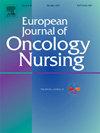心理健康在肿瘤护士正念与患者教育实施之间的中介作用:一项横断面研究
IF 2.7
3区 医学
Q1 NURSING
引用次数: 0
摘要
目的探讨肿瘤护士正念与心理健康、患者教育实施的关系。此外,研究了影响患者教育实施的决定因素,并研究了心理健康在正念与患者教育实施之间的中介作用。方法对某肿瘤医院2023 ~ 2024年的肿瘤护士进行横断面研究。本研究采用经过验证的工具,包括护士信息表、正念注意意识量表、心理健康量表、患者教育实施量表。使用描述性统计和相关统计以及结构方程模型对数据进行分析。自变量为正念和心理健康;在这个假设的模型中,因变量是患者教育的实施。结果共218名护士参与了本研究。不同专业角色的患者教育执行得分差异显著,主管护士的患者教育执行得分较高(F = 4.076, p = 0.008)。结构方程模型分析表明,正念对患者教育实施有显著的直接影响(β = 0.180, p <;.001),同时也有间接影响(β = 0.117, p <;.001)受心理健康调节。这些结果表明,心理健康在正念与患者教育实施的关系中起部分中介作用。结论本研究强调,更高的正念与改善患者教育实施相关,通过直接或间接地增强心理健康。护理管理者应该认识到正念和心理健康对护士提供高质量患者教育的能力的影响,并考虑提高这些属性的策略。本文章由计算机程序翻译,如有差异,请以英文原文为准。
The mediating role of psychological well-being in the relationship between mindfulness and patient education implementation among oncology nurses: A cross-sectional study
Purpose
This research investigates the relationships between mindfulness, psychological well-being, patient education implementation among oncology nurses. Additionally, it examines the determinants influencing patient education implementation and investigated the mediating function of psychological well-being in the association between mindfulness and patient education implementation.
Methods
A cross-sectional study was conducted with oncology nurses between 2023 and 2024 at an oncology hospital. The study utilized validated instruments, including the Nurse Information Form, Mindful Attention Awareness Scale, Psychological Well-Being Scale, Patient Education Implementation Scale. The data were analysed using descriptive and correlational statistics and structural equation modelling. Independent variables were mindfulness and psychological well-being; the dependent variable was patient education implementation in this hypothesized model.
Results
A total of 218 nurses participated in the study. Patient education implementation scores varied significantly by professional roles and were higher among charge nurses (F = 4.076, p = .008). The structural equation modeling analysis demonstrated that mindfulness exerted a significant direct influence on patient education implementation (β = 0.180, p < .001), while also having an indirect effect (β = 0.117, p < .001) mediated by psychological well-being. These results indicate that psychological well-being serves as a partial mediator in the mindfulness and patient education implementation relationship.
Conclusion
This study highlights that higher mindfulness are associated with improved patient education implementation, both directly and indirectly through enhanced psychological well-being. Nursing managers should recognize the impact of mindfulness and psychological well-being on nurses' ability to provide high-quality patient education and consider strategies to enhance these attributes.
求助全文
通过发布文献求助,成功后即可免费获取论文全文。
去求助
来源期刊
CiteScore
4.40
自引率
3.60%
发文量
109
审稿时长
57 days
期刊介绍:
The European Journal of Oncology Nursing is an international journal which publishes research of direct relevance to patient care, nurse education, management and policy development. EJON is proud to be the official journal of the European Oncology Nursing Society.
The journal publishes the following types of papers:
• Original research articles
• Review articles

 求助内容:
求助内容: 应助结果提醒方式:
应助结果提醒方式:


